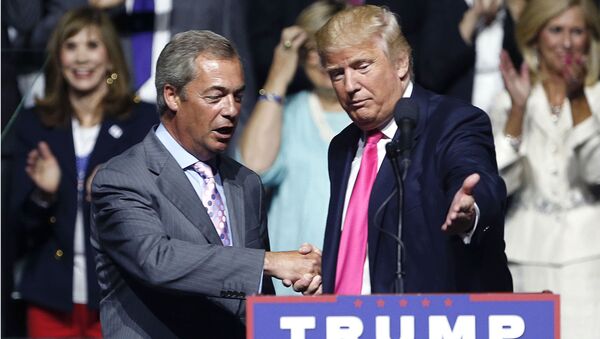Dr Martin Farr, Senior Lecturer in Contemporary British History at Newcastle University, reflects on the likelihood and effectiveness of such an alliance.
Sputnik: In an interview, Donald Trump said that Boris Johnson should get together with Brexit Party leader Nigel Farage ahead of the upcoming election campaign. How high are the chances that this alliance may take place? How effective this can be?
Martin Farr: Donald Trump intervention in the British election is completely without any precedent. The convention has always been that presidents and prime ministers do not intervene rhetorically or in any other way - with elections in the country and they only ever say they're prepared to work with whoever is the victor in the election. So once again, Donald Trump has ripped up all convention and precedent in terms of his comments yesterday. The fact that he was speaking on Nigel Farage’s radio program itself is remarkable. And he has a long history with Farage. Farage was supporting him in his campaign for president. He campaigned for him in Mississippi. Trump has been very praiseworthy of Farage and suggested him being a British ambassador to the United States, which again is a breach of all convention protocols. So there's a history to them there. In terms of his recommendation of a pact - that's very unlikely - because the Conservative Party sees itself as being a national party able to contest every constituency. Brexit Party is a much smaller, much younger party with less resources. But it could damage the conservatives in those constituencies. But I suspect the Conservative Party itself and Boris Johnson personally will be very reluctant to have anything like a formal agreement with him.
Sputnik: Corbyn wrote on Twitter - “Trump is trying to interfere in UK election to get his friend Boris Johnson elected”. How much of an influence can Donald Trump’s statements be?
Martin Farr: Donald Trump's statements may have an unexpected influence in the sense that the Labour Party and Jeremy Corbyn who he personally criticised could benefit enormously from that because Trump is not popular in Britain, unlike his predecessor. And his comments may not be that welcome to the Conservative Party and Boris Johnson. It's striking how far Johnson has sought to distance himself from Trump as prime minister, given how supportive Trump been Johnson as the person to replace Theresa May. So the intervention may have an unexpected and unintended consequence.
Sputnik: In what place are Jeremy Corbyn and the Labour Party right now? How popular is their agenda?
Martin Farr: The Labour Party's agenda for the election is problematic in the sense that it has a very full range of domestic programs. But its policy manifesto is being overshadowed by Brexit, which is one reason why the party wanted to have the election after Brexit rather than before. And the party itself is divided. Its position is ambiguous and that's one of the concerns they have - that their message about the health service, about jobs and about austerity may be drowned out by this. They have the additional problem of their leader being the most unpopular leader of the opposition since records began in the 1970s. And in 2017 he had poor personal ratings as well, and the party did extremely well and he campaigned very well. The question for Labour is whether they can repeat performance in 2017 and overcome the fact that he can be unpopular with large numbers of voters that the party needs to attract.
Sputnik: What outcome may we expect in the general election?
Martin Farr: This is the most unpredictable and unknowable general election that I can remember or know about - because we have effectively in England four parties now. We have a system which only admits of one MP in each constituency. So it's very hard to find many seats which possibly prevail. And the competition of the new parliament, the Conservative Party needs to have a majority to be in government, whereas Labour could be in government with competent support from the Lib Dem. So I think it's easier for the party to form a government after the election than the conservative European. If you want Brexit, vote conservative.



